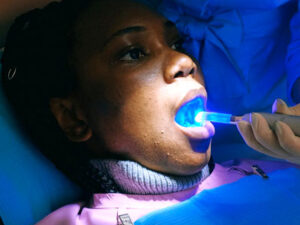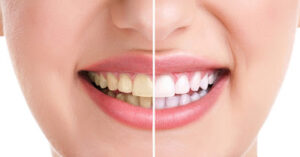Best Dental Implants Clinic in Ecil, AS Rao Nagar, Secunderabad

Smile Dental & Implant Centre: Your Premier Destination for Dental Implants in Ecil, AS Rao Nagar, Secunderabad
For exceptional dental implant services in Secunderabad, choose Smile Dental & Implant Centre. As a leading clinic, we offer high-quality care to ensure you smile with confidence.
Located in the heart of Secunderabad, our facility is accessible to residents of Kapra, Ecil, AS Rao Nagar, Dammaiguda, Nagaram, Kushaiguda, and Moulali. Our skilled dental professionals provide personalized attention and top-notch service to every patient.
We specialize in dental implants, the gold standard for replacing missing teeth, designed to blend with your natural teeth, restoring function and aesthetics. Whether due to age, accidents, or dental issues, our experts use the latest techniques for optimal results, prioritizing your comfort.
Trust Smile Dental & Implant Centre for your dental implant needs. Contact us today to schedule a consultation and start your journey to a lasting, transformed smile.
Dental Implants:
Dental implants are biocompatible metal posts or frames that are surgically inserted into the jawbone beneath the gums. After it fuses into the jaw bone over a period of time, the dentist can mount the replacement teeth onto them. It looks and lasts like the real tooth. A Tooth implant is the best replacement for a missing tooth which is a prototype of a natural tooth root.
WHY DENTAL IMPLANTS?
- Speech problems
- Chewing problems
- Face may look older and wrinkled with sunken
- Pain in the facial muscles of the jaw
- Tooth decay and gum diseases
- Improper bite because of a tilt of adjacent teeth into the emptied spaces
- Untreated missing teeth may dent the facial expressions
- Hiding smile during discussions or at public gatherings
Advantages:
- Dental Implants help restore the missing tooth
- Implants are a long-lasting solution with the ability to outlive the patient
- Dental Implants help to maintain the shape and contour of the face and smile
- Implants never harm the adjacent tooth structure
- Implants guarantee superior appearance and comfort with speech
- Implants boost your confidence for being an ideal solution
- Implants give the opportunity to make the most of your favourite foods
Implant Procedure:
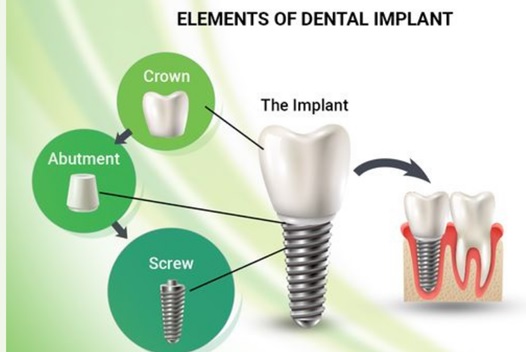
Placing The Implant
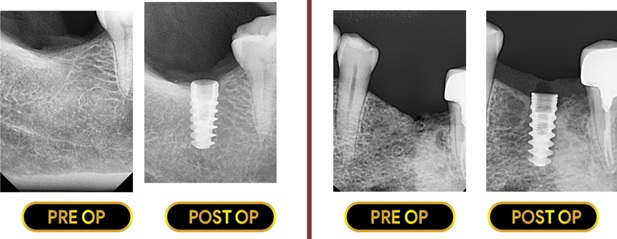
Healing
Abutment Placement
Placement Of Permanent Crown
Post-Operative Instructions For Dental Implants
- Avoid touching, spitting, or rinsing the injury on surgery day. Try not to touch the metal healing abutment jutting through the gum tissue.
- After implantation, it’s normal to have some bleeding or redness in the mouth for 24 hours. To control excessive bleeding, bite on a cloth pad (placed on the wound) for 30 minutes. In case if bleeding doesn’t stop, look for additional instructions from your dental specialist.
- Swelling is normal after surgery. To limit it, apply an ice pack on the cheek in the surgical area (you can also use a plastic sack or an ice-filled towel). Apply the ice as much as possible for the initial 36 hours.
- Drink a lot of liquids but avoid hot beverages. Stick to a soft diet on the surgery day. You can return to the normal diet once the surgical area is healed. Try not to drink anything using a straw.
- Start taking pain killers as soon as you feel the impacts of the local anesthetic are going down. However, take the medicines recommended by the dentist.
- Healing is not possible without oral hygiene. Use the prescribed oral rinse while the day after surgery, use the recommended oral rinse twice after breakfast and before bed. Rinse for at least 30 seconds and then spit it out. Use warm salt rinses at any rate 4-5 times each day too. Be gentle initially while brushing the wound to not affect the healing.
- Try not to use, or consume, tobacco items in any form or any type after implants. It not only hinders healing as well as increases the odds of implant failure.
- Try not to take part in practice following the surgery or keep it minimal, at best. You should realize that exercise may cause bleeding or throbbing, and it truly happens, stop the activity immediately. This may weaken you since you’re not taking normal food.
- Healing abutments will be placed at the time of implant placement. So, do rinse them frequently and keep them clean. Wait for the stitches to dissolve and clean the abutments through smooth massage.
- Try not to use incomplete or full dentures or flippers following surgery or for 10 days afterward at least.
Post-Implants Care
- Brush twice a day
- Choose your toothbrush cautiously
- Change your toothbrush after every 2 or 3 months
- Go gentle and thoroughly and don’t use an excessive amount of power while brushing
- Floss at least once every day to keep plaque, bacteria, and foods struck between the teeth out as it helps keep implants in good condition
- Take proper oral care at home to make your dental implants forever
- Use mouth rinses once daily after meals
- Try not to eat sticky foods as implants can draw more bacteria
- Eating and drinking right can enable your implants to avoid harm’s way
Visit the dental clinic near you regularly and try to achieve good oral hygiene to make your implants last forever.
All-On-4 dental implants
All 4 Dental implants contain 4 implants placed in a completely teeth-less jaw, providing secure and optimal support for a fixed 12-14 unit Bridge or Hybrid Prosthesis. The posterior two implants are specially designed and angulated to achieve, the most Comprehensive, Successful, Safe, Simpler, Graft-less, Minimum-Number-Implant-Solution for completely missing teeth.
The All-on-4 Dental Implants solution will address these drawbacks because it consists in establishing fully customized fixed teeth, based only on four titanium implants, anchored into the basal bone. These implants act as “pillars” to the bridge that supports the prosthetic teeth. This most successful procedure allows taking advantage of existing bone, even if scarce, avoiding having to use bone grafts, sinus lift surgeries, nerve repositioning on the lower jaw, etc. The posterior implants are substantially angled at approximately 45 degrees to avoid compromising the sinus cavity in the upper jaw and the nerve canal in the lower jaw.
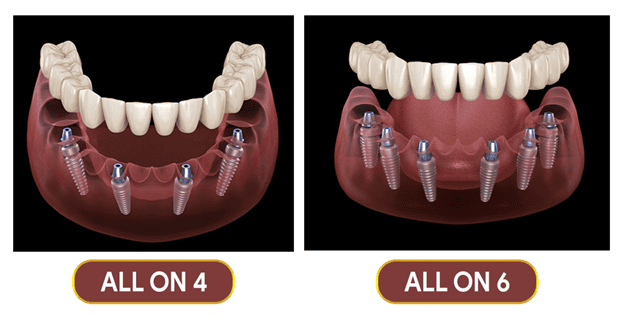
All-On-6?
- Suitable for almost all bone quantities.
- None or a very small bone graft is required.
- Simple and good predictability from a surgical perspective
- Well-balanced prosthetic support for an immediate function procedure
- The attractive prosthetic solution, Immediate Function & fixed prosthesis
- No healing time is required prior to functioning
- Fast, fixed, and cost-effective.
- It is one of the best implant-supported fixed teeth protocol
Dental implants Cost in Hyderabad
If you are considering dental implants in Hyderabad, India, there are several factors to consider before making an appointment with your dentist:
Best Dental Implantologist in Secunderabad
The best dental implant surgeon in Secunderabad is Dr Sudhakar Mds who is a well-known and experienced dental implant specialist. He has 15 years of experience in the field of dentistry and he has been successfully performing dental implants for over 13 years. His expertise and knowledge make him a great choice for your dental implant procedure. Dr Puli Sudhakar, Mds has a team of highly qualified professionals to assist you during all stages of your treatment.



